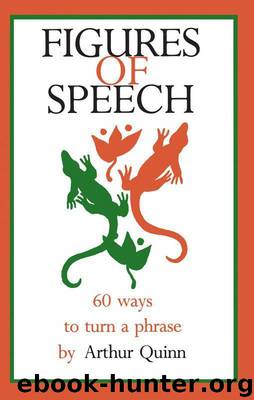Figures of Speech: 60 Ways To Turn A Phrase by Arthur Quinn

Author:Arthur Quinn
Language: eng
Format: mobi
Publisher: Taylor and Francis
Published: 2012-11-12T09:00:00+00:00
VI
More than Enough
THE MOST INFLUENTIAL work written in early modern Europe on the figures of speech was De Copia by Erasmus. As the title suggests, Erasmus was primarily interested in teaching how to write more copiously. His readers would learn how to use many words where the common herd used only a few. At one point he developed more than a hundred variations on the sentence “Your letter has delighted me very much.” “With what joy do you suppose I am filled when I recognize your soul in your letter! When the letter carrier handed me your letter, my spirit at once began to thrill with an ineffable joy. How shall I tell you what joy titillated the spirit of your Erasmus when he received your letter?” Hemingway would not approve.
The baroque identification of eloquence with copiousness is so far from official twentieth century taste that scarcely a guidebook on writing does not contain an admonition such as the following: “Be brief. Do not repeat yourself. Say what you have to say in as few words as possible. To belabor your point is to risk boring your reader—or even insulting his intelligence.”
Erasmus would not lack words for a reply. He would point out that the author of this advice had thought it so important that he was not brief, did repeat himself, used as many words as he dared, and had insulted the intelligence of his reader by contradicting himself in the process. “How shall I tell what joy titillated the spirit of your Erasmus when he read your foolish passage?”
The simplest form of copiousness is pleonasm. We know we have a pleonasm when we can eliminate words without changing meanings. Pleonasms are what blue pencils remove. But blue pencils are not always right—or at least not always on the side of God. The Bible is full of pleonasms. As often as not, words like “face,” “mouth,” “sons,” “children,” “name,” “hand,” “voice,” are used pleonastically—and certain formulaic phrases like “it came to pass” always are.
And the Spirit of God moved upon the face of the waters.
Gen. 1:2
And they heard the voice of the Lord God walking in the garden in the cool of the day.
Gen. 3:8
By reason of the voice of my groaning my bones cleave to my skin.
Ps. 102:5
At her feet he bowed, he fell, he lay down: at her feet he bowed, he fell: where he bowed, there he fell down dead.
Judg. 5:27
The conclave of all the night’s stars, those potentates blazing in the heavens that bring winter and summer to mortal men, the constellations
Aeschylus
A child of our grandmother Eve, a female; or, for thy more sweet understanding, a woman.
Shakespeare, LLL 1.1.263
The inaudible and noiseless foot of time
AW 5.3.41
When that I was and a little tiny boy
TN 5.1.398
I saw the wound, I saw it with mine eyes.
R&J 3.2.52
This was the most unkindest cut of all.
Shakespeare, JC 3.2.188
Give you a reason on compulsion! if reasons were as plenty as blackberries, I would give no man a reason upon compulsion, I.
Download
This site does not store any files on its server. We only index and link to content provided by other sites. Please contact the content providers to delete copyright contents if any and email us, we'll remove relevant links or contents immediately.
Cecilia; Or, Memoirs of an Heiress — Volume 1 by Fanny Burney(32544)
Cecilia; Or, Memoirs of an Heiress — Volume 2 by Fanny Burney(31941)
Cecilia; Or, Memoirs of an Heiress — Volume 3 by Fanny Burney(31928)
The Lost Art of Listening by Michael P. Nichols(7488)
Asking the Right Questions: A Guide to Critical Thinking by M. Neil Browne & Stuart M. Keeley(5757)
We Need to Talk by Celeste Headlee(5608)
On Writing A Memoir of the Craft by Stephen King(4928)
Dialogue by Robert McKee(4386)
Pre-Suasion: A Revolutionary Way to Influence and Persuade by Robert Cialdini(4217)
I Have Something to Say: Mastering the Art of Public Speaking in an Age of Disconnection by John Bowe(3872)
Elements of Style 2017 by Richard De A'Morelli(3339)
The Book of Human Emotions by Tiffany Watt Smith(3300)
Fluent Forever: How to Learn Any Language Fast and Never Forget It by Gabriel Wyner(3077)
Name Book, The: Over 10,000 Names--Their Meanings, Origins, and Spiritual Significance by Astoria Dorothy(2978)
Why I Write by George Orwell(2944)
Good Humor, Bad Taste: A Sociology of the Joke by Kuipers Giselinde(2941)
The Art Of Deception by Kevin Mitnick(2796)
The Grammaring Guide to English Grammar with Exercises by Péter Simon(2736)
Ancient Worlds by Michael Scott(2681)
